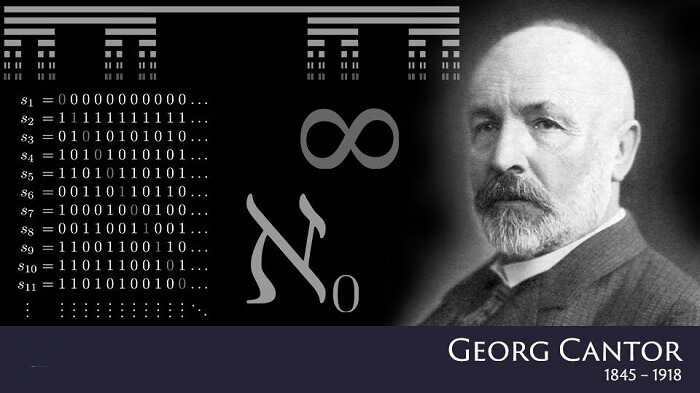A mathematical charlatan or a genius: who is Georg Cantor?
Both of his parents had musical talents, and Cantor was an outstanding violinist, showing the same affinity for music. But he chose mathematics as his career...

Georg Cantor was the first to express the idea that the concepts of set and infinity should be taken seriously and that if they are not taken seriously, we will grapple with inextricable paradoxes. The French mathematician Henri Poincaré (1854–1912) referred to Cantor's ideas as a "serious illness" affecting the discipline of mathematics. The German mathematician Leopold Kronecker (1823-1891) personally attacked Cantor, accusing him of "charlatanism" and corrupting the youth.
So what is so controversial about Georg Cantor?
Georg Cantor was born in St Petersburg, Russia, in 1845. Both of his parents had musical talents, and Cantor was an outstanding violinist, showing the same affinity for music. His family settled in Germany in 1856 after his father's illness. Cantor demonstrated outstanding skills in mathematics during his school years. He graduated from high school in 1860 with great success. He later studied mathematics at the Swiss Federal Polytechnic and the University of Berlin.
Georg Ferdinand Ludwig Philipp Cantor (3 March 1845 – 6 January 1918) was a mathematician. He played a pivotal role in the creation of set theory, which has become a fundamental theory in mathematics. Cantor established the importance of one-to-one correspondence between the members of two sets, defined infinite and well-ordered sets, and proved that the real numbers are more numerous than the natural numbers. Cantor's method of proof of this theorem implies the existence of an infinity of infinities. He defined the cardinal and ordinal numbers and their arithmetic. Cantor's work is of great philosophical interest, a fact he was well aware of.
In 1867, Georg Cantor received his doctorate from Berlin with a thesis based on the theory of numbers. He then began teaching at the University of Halle, where he spent most of his academic career. Two more articles on number theory were published in Crelle's Journal, one of the most respected mathematical journals, in 1871 and 1872. Everything was going well. And now it's time...
Cantor's Dangerous Ideas
Up until Cantor, mathematicians stood in eternity, in a place that was clearly felt but unlikely to be dealt with, at least to be embedded in mathematics. This concept was of more interest to theology than to mathematics. Cantor, often referred to as the originator of set theory, had invented new mathematical concepts of infinity based on the brilliant idea to compare sets containing an infinite number of elements.
What Cantor did was treat infinity as an entity in itself. If we can count the elements in a set, we call it a finite set, otherwise an infinite set. If two finite sets have the same number of elements, the number of elements is also the same. The crux of the matter actually starts here. Can the number of elements of two infinite sets be different? Cantor was the first to tell us that this is possible.
However, reducing infinity to mathematics would confront Cantor not only with conservative mathematicians but also with some clergy who defended sacred values. Georg Cantor knew that sooner or later people would accept groundbreaking ideas. Unfortunately, he would also lose his mental health at the price of it.
Cantor also showed that there are infinities of different "dimensions" between uncountable sets and developed arithmetic of infinities.
Georg Cantor Would Take a Long Time to Understand
When Georg Cantor published these results, it shocked the mathematical community. Cantor was well aware of the opposition his ideas faced. Cantor was very worn out by the resistance to his ideas and the fact that this resistance sometimes turned to his personality.
Especially when Mittag-Leffler wrote that it was necessary to wait until 1984 for the publication of an article, his exhausted body let him down. He had his first depression that year. Until his death, he would be hospitalized frequently and would be treated for a long time each time.
He never recovered enough to do math again. But he didn't stay idle when he wasn't in the hospital. He founded the German Mathematical Society in 1890 and was elected its first president. While he was waiting to recover enough to do the math, he became interested in a topic that is still controversial today. He wrote articles supporting the claims that there was no Shakespeare and that Francis Bacon wrote all those plays.
He received an honorary doctorate from the University of St Andrews in 1912 but was unable to accept the diploma in person due to his illness. Georg Cantor retired in 1913, poor and debilitated. In 1917 he started living in a sanatorium in Halle, Germany. Later, on January 6, 1918, he died in the sanatorium as a result of a heart attack.
What remains of Cantor is the concept of infinity and set theory, which was introduced to the world of mathematics long before his time. Humanity would remember the eternity that he opened with the words of the famous mathematician Hilbert. “No one will be able to expel us from the paradise where Cantor opened the door. “
